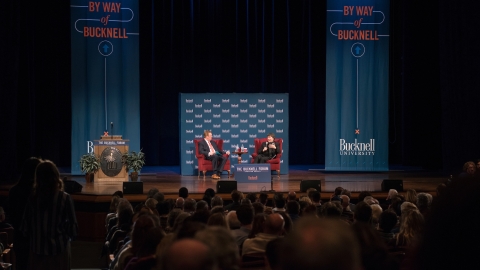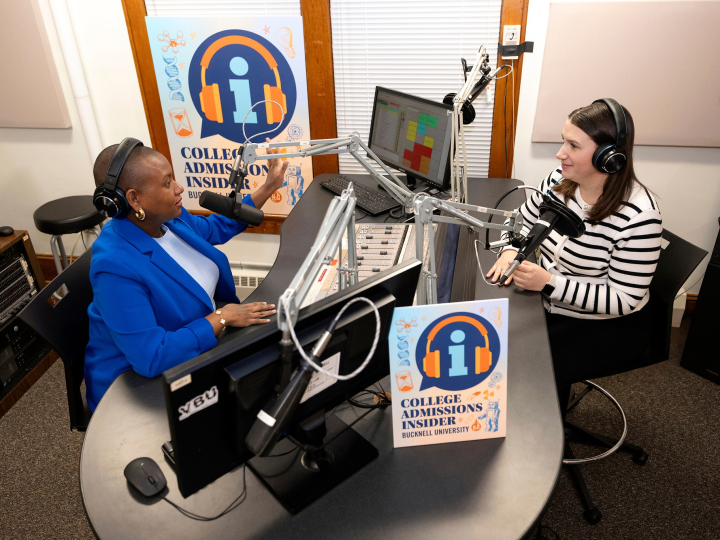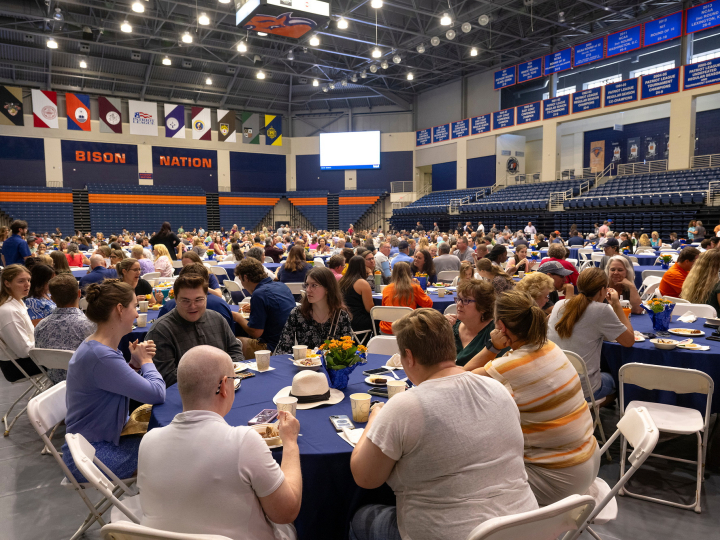
Ken Burns Takes Bucknell Behind the Scenes of ‘The Vietnam War’
April 10, 2018
In crafting his latest documentary miniseries, The Vietnam War, filmmaker Ken Burns and his team combed through hundreds of hours of video footage, much of it never before broadcast, in order to place his viewers in helicopters and bunkers on both sides of the conflict's battle lines. But there was an obstacle to achieving the verisimilitude that Burns sought: almost none of that footage came with sound.
To more authentically transport his viewers to the war's front lines, Burns and his crew devised a Hollywood-style solution. They made audio recordings of an arsenal of period-accurate weaponry bombarding the woods near his New Hampshire home and studio.
"We added in the midst of the Tet Offensive — probably the loudest ruckus in our series — 160 soundtracks," Burns told a rapt crowd at Bucknell University on April 9. "We were out in our woods in New Hampshire with M16s and AK-47s, firing them off to get the right amount of sound. What does it sound like from a few hundred meters away? What does it sound like from right up close? [...] We got down to that level of detail."
The anecdote was one of many behind-the-scenes looks at his craft that the chronicler of the American experience — whose more than 30 films include The Civil War, Baseball and The Roosevelts — offered listeners during his appearance at Bucknell's Weis Center for the Performing Arts. Following a 15-minute address about his 18-hour Vietnam project, Burns was interviewed by Bucknell President John Bravman and took questions directly from audience members.
Find Your Path
The event was hosted as part of the Bucknell Forum speaker series, which since 2007 has invited nationally renowned leaders, scholars and commentators to Bucknell to discuss various issues from multidisciplinary and diverse viewpoints. Other recent Forum speakers include Anderson Cooper, Common and Jane Goodall.
A Nuanced Look at a Complicated Conflict
Much of Burns' talk dealt with the challenges of documenting a conflict as complex, long-running and traumatic as the Vietnam War. Producing his 10-episode documentary on the subject took the same number of years and during that decade his relatively small staff collected tens of thousands of still images and video clips. They crossed the nation and the Pacific Ocean to record nearly 100 interviews, 79 of which made the final cut. Drawing on his New Hampshire roots, Burns likened the process to boiling down 40 gallons of sap to make just one gallon of maple syrup. What emerged was a twisted yarn, but also one that reversed some common assumptions about the war.
"The undertow was unbelievable," he reflected. "When I was working on my Jazz series, the great trumpeter Wynton Marsalis said, 'Sometimes a thing and the opposite of a thing is true at the same time.' We found that in Vietnam, sometimes you had 20 different things that were true at the same time."
Lessons from a Master Filmmaker
Prior to his public speech, Burns shared finer notes about his process for weaving narrative threads together with a small group of Bucknell students, offering personal recollections and reflections about the fear he still feels before each new interview, how digital media has and hasn't changed the craft and the power of filmmaking.
"He really conveys the love he has for filmmaking," said attending student Phil Amarante '18, a biomedical engineering major who worked on a television documentary, Stories of the Susquehanna Valley: Utopian Dreams, as part of a Bucknell English class. "He really showed his passion and the fact that he's got a hand in every piece of the process."
And while a gulf of personal experience existed between Burns, who wasn't drafted but became draft eligible in the waning years of the war and the students, for whom it may seem that "Vietnam is as far away almost as World War II," he said that his latest film holds lessons in equal part for both generations.
"I've realized that I've made the same film over and over again and that film asks one deceptively simple question: Who are we?" Burns said. "Who are those strange and complicated people who like to call themselves Americans and what does an investigation of the past tell me about not only where we were, but also where we are and, most importantly I suppose, where we may be headed?"
The interview portion of Burns' appearance was recorded by PBS affiliate WVIA and will premiere on Thursday, April 19, at 8 p.m.

